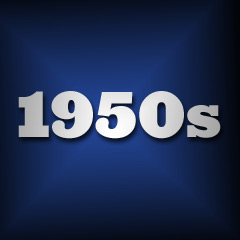
|
![]()
Greatest Films of the 1950s
1950 | 1951 | 1952 | 1953 | 1954 | 1955 | 1956 | 1957 | 1958 | 1959
Title Screen Film Genre(s), Title, Year, (Country), Length, Director, Description 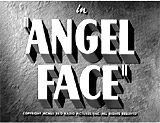


Angel Face (1953), 91 minutes, D: Otto Preminger
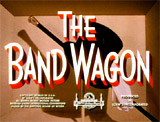

The Band Wagon (1953), 111 minutes, D: Vincente Minnelli
Under the guidance of MGM producer Freed, Vincente Minnelli (with Michael Kidd as choreographer) directed this extravagant, big-scale classic that marked a pinnacle for backstage musicals. Five songs were reprised from the original 1931 Broadway musical - The Band Wagon (which also starred Astaire), created by the song-writing team of Howard Dietz and Arthur Schwartz. With a witty screenplay by Betty Comden and Adolph Green, it has often been thought of as Fred Astaire's best MGM musical, although it did only moderately well at the box-office. And it had only three Academy Award nominations, including Best Musical Score (Adolph Deutsch), Best Original Story/Screenplay, and Best Costume Design. Astaire starred as Tony Hunter, a fading Hollywood movie star interested in a Broadway comeback as a sparkling, song-and-dance man. His intention was to perform in a new light-hearted musical (known as 'The Band Wagon') scripted by his friends Lily (Fabray) and Lester Marton (Levant). A clash of egos occurred when rising, pretentious theater star/actor Jeffrey Cordova (Jack Buchanan) became the "artistic" director and insisted on making it a modernistic, dark Faustian tale. Hunter's co-star was long-legged ballerina Gabrielle Gerard (Charisse), a Broadway novice. The duo performed the classic, graceful, and elegant 'getting to know you' number "Dancing in the Dark" in Central Park. Although the premiere of Cordova's show failed, it succeeded when it was rewritten and returned to the Martons' original script and songs. Tony and Gabrielle also appeared in the film's jazzy balletic finale, the "Girl-Hunt Ballet" production number (memorably choreographed by Michael Kidd) - a film-noiric take-off or satire of Mickey Spillane's hard-boiled pulp detective novels ("She came at me in sections...more curves than the scenic railway"). In the number, Astaire and Charisse portrayed the characters of private eye Rod Riley and a dangerous femme fatale brunette siren in a slinky, sparkling red dress. The musical featured the well-recognized anthem song - a hymn to show business - "That's Entertainment" that was sung and danced by the ensemble (Buchanan, Levant, Fabray, and Astaire), and reprised at the end of the film. In the film's opening sequence, Astaire performed the solo song "By Myself" as he strolled down a NYC railroad platform when reporters ignored him and favored the arrival of Ava Gardner instead, and he also appeared in the duet "A Shine On Your Shoes" with a black shoeshine boy (Leroy Daniels) in a 42nd Street penny arcade. In addition, the hilarious Triplets (Astaire, Fabray, and Buchanan) were dressed up as baby siblings.


Beat the Devil (1953, US/UK/It.), 100 minutes, D: John Huston


The Bigamist (1953), 80 minutes, D: Ida Lupino
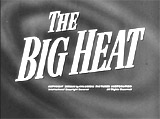


The Big Heat (1953), 89 minutes, D: Fritz Lang
A dark, very brutal and violent, classic, expressionistic film noir/melodrama and gangster film that explores the seamy underworld of American organized crime. Following the suicide of a guilt-stricken, supposedly-honest fellow cop, homicide Sgt. Dave Bannion (Glenn Ford) is determined to discover the truth. A car bomb meant for him accidentally kills his wife Katie (Jocelyn Brando). Suspended from duty on the force, he tenaciously avenges the mob's murder of his wife, confronting the city crime ring to uncover the truth. A hard-hitting showdown is destined with ruthless, meglomaniacal kingpin Mike Lagana (Alexander Scourby), aided by a sadistic, psychotic thug Vince Stone (Lee Marvin). One of the film's most celebrated scenes is the coffee-scalding scene - an enraged Stone hurls his boiling coffee into the face of his moll girlfriend Debby Marsh (Gloria Grahame) - in retribution, she courageously aids Bannion's search for the culprits and returns the coffee-scalding favor to Vince.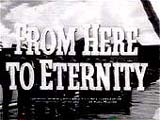


From Here to Eternity (1953), 118 minutes, D: Fred Zinnemann
Based on James Jones' best-selling, hard-hitting novel of on-duty/off-duty military life among recruits in the pre-Pearl Harbor era of 1941 - on the eve of WWII. A Best Picture-winner - a combination romance, combat and melodramatic film set at the Schofield Barracks Army base on Oahu. Sensitive bugler Pvt. Robert E. Lee "Prew" Prewitt (Montgomery Clift) is dealt harsh treatment when he stubbornly refuses to fight for the company's boxing team. The bored company commander's wife Karen Holmes (Deborah Kerr) engages in a torrid affair with the good-guy Sgt. Milton Warden (Burt Lancaster) - their embrace in the pounding surf is indelibly imprinted in cinematic history. Pruitt falls in love with a nightclub "hostess" (prostitute) Alma (Lorene) (Donna Reed). Meanwhile, Prew's Italian friend Angelo Maggio (Frank Sinatra) is tormented by sadistic stockade Sgt. "Fatso" Judson (Ernest Borgnine).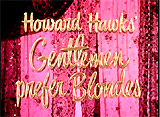


Gentlemen Prefer Blondes (1953), 91 minutes, D: Howard Hawks


House of Wax (1953), 90 minutes, D: Andre de Toth
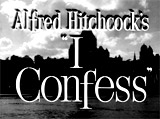



I Confess (1953), 95 minutes, D: Alfred Hitchcock
In this film-noirish crime thriller/drama, humble Canadian (Quebec) priest Father Michael William Logan (Montgomery Clift), an ex-war hero, listened in the church booth to the confidential confessions of his church's live-in handyman/caretaker Otto Keller (O.E. Hasse), a German refugee. Keller admitted that he had disguised himself as a priest, and in a failed robbery attempt killed lawyer Villette (Ovila Légaré), where he served as part-time gardener. Keller also told his wife Alma (Dolly Haas), the church's housekeeper about his crime. Innocent, martyr-like Father Logan was implicated and became a prime suspect, after two schoolgirls testified that they saw a priestly figure leaving Villette's home at the time of the crime. Father Logan was unwilling to reveal his knowlege or his whereabouts (at the time of the murder) to anyone, claiming rigid sanctity known as 'priest-penitent privilege.' He also refused to tell anything to Police Inspector Larrue (Karl Malden). During the investigation, Logan's pre-priesthood lover Ruth Grandfort (Anne Baxter), married to respected Parliament member Pierre Grandfort (Roger Dann), attempted to help by providing Logan with an alibi. She stated that she was meeting with Logan just before the time of Villette's murder. They were discussing Villette's blackmailing attempt. [Note: About five years earlier, seen in flashback, Villette scandalously saw the married Ruth and Logan spend the night together during a storm - although they were chaste - and now threatened to divulge this information.] Police turned around her testimony, concluding that Logan had a clear motive to kill Villette. They also discovered (planted) bloody priest's robes in the bottom of Logan's chest, with a blood type that matched Villette's. Father Logan was accused of the murder and went to trial, denying any involvement in the murder, while not revealing anything about Keller's confession. Prosecutor Willie Robertson (Brian Aherne) insinuated (unfairly) that Logan and Ruth were having an ongoing affair. The jury ruled that Logan was not guilty, because of insufficient evidence. As Logan left the courtroom, the angry, suspicious and hostile crowd believed he was guilty. Knowing the truth of the murderer's identity, Keller's wife Alma attempted to tell a policeman that her husband was the real killer - she was silenced by a bullet from the panic-stricken Keller. The police went to arrest Keller, cornered in a hotel ballroom. The killer incriminated himself when he accused Logan of hypocrisy - by telling the police about his confession. When Father Logan approached Keller to plead with him to surrender, Keller attempted to shoot Logan, but was killed by a police sniper.
Julius Caesar (1953), 120 minutes, D: Joseph L. Mankiewicz



Madame De... (1953, Fr./It.) (aka The Earrings of Madame De...), 105 minutes, D: Max Ophuls

Monsieur Hulot's Holiday (1953, Fr.) (aka Les Vacances De Monsieur Hulot), 114 minutes, D: Jacques Tati
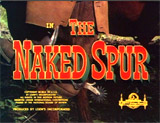

The Naked Spur (1953), 93 minutes, D: Anthony Mann
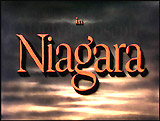




Niagara (1953), 89 minutes, D: Henry Hathaway


Pickup on South Street (1953), 80 minutes, D: Samuel Fuller


The Robe (1953), 135 minutes, D: Henry Koster
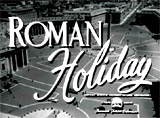


Roman Holiday (1953), 118 minutes, D: William Wyler
An Oscar-winning story from Hollywood Ten blacklisted screenwriter Dalton Trumbo, who was fronted by Ian McLellan Hunter. The delightful, old-fashioned, dramatic, fairy-tale courtship film, a variation of Capra's It Happened One Night, was shot on location and contains the first major starring role of the much-beloved Audrey Hepburn. A modern-day Princess (Audrey Hepburn) is quickly bored with ceremonial protocol during an official visit to Rome. After slipping away from her attendants and entourage, she goes 'incognito' and encounters an American newspaperman Joe Bradley (Gregory Peck) who sees an opportunity for an exclusive scoop. However, romance blossoms between them during their 'common people' adventures throughout the city, as they are pursued by the journalist's photographer friend Irving (Eddie Albert) who takes candids. The newspaperman's intentions change when he realizes he's falling in love.


Shane (1953), 117 minutes, D: George Stevens
A classic adult Western based on the novel by Jack Schaefer, about a lone, handsome gunfighter Shane (Alan Ladd), who drifts into a beautiful 19th century Wyoming valley. As a hired hand for the pioneer homesteading Starrett family, Marion (Jean Arthur) and Joe (Van Heflin), Shane is goaded into valiantly defending them and other farmers from vicious threats made by ruthless cattle ranch baron Ryker (Emile Meyer), and hired, black-outfitted gunslinger Wilson (Jack Palance). The family's young son Joey (Brandon de Wilde) worships the heroics and bravery of Shane, and is heartbroken when the nomadic loner rides off at the film's conclusion.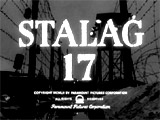


Stalag 17 (1953), 120 minutes, D: Billy Wilder




Summer With Monika (1953, Swe.) (aka Sommaren Med Monika), 96 minutes, D: Ingmar Bergman


Tokyo Story (1953, Jp.) (aka Tokyo Monogatari), 136 minutes, D: Yasujiro Ozu



Ugetsu Monogatari (1953, Jp.) (aka Tales of Ugetsu), 94 minutes, D: Kenji Mizoguchi



The Wages of Fear (1953, Fr./It.) (aka Le Salaire De La Peur), 141 minutes, D: Henri-Georges Clouzot


The War of the Worlds (1953), 85 minutes, D: Byron Haskin


The Wild One (1953), 79 minutes, D: Laslo Benedek